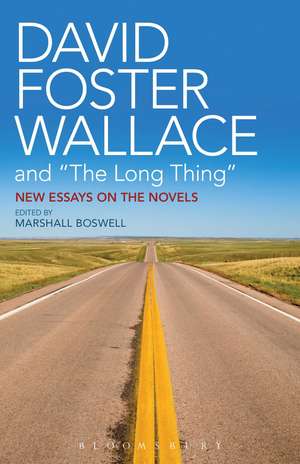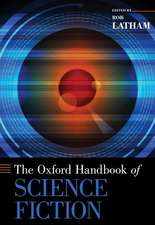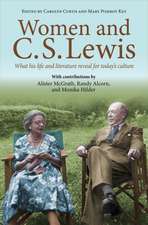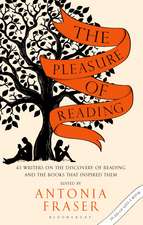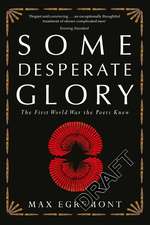David Foster Wallace and "The Long Thing": New Essays on the Novels
Editat de Marshall Boswellen Limba Engleză Paperback – 24 sep 2014
| Toate formatele și edițiile | Preț | Express |
|---|---|---|
| Paperback (1) | 191.85 lei 43-57 zile | |
| Bloomsbury Publishing – 24 sep 2014 | 191.85 lei 43-57 zile | |
| Hardback (1) | 831.03 lei 43-57 zile | |
| Bloomsbury Publishing – 24 sep 2014 | 831.03 lei 43-57 zile |
Preț: 191.85 lei
Preț vechi: 222.87 lei
-14% Nou
Puncte Express: 288
Preț estimativ în valută:
36.71€ • 38.11$ • 30.61£
36.71€ • 38.11$ • 30.61£
Carte tipărită la comandă
Livrare economică 24 martie-07 aprilie
Preluare comenzi: 021 569.72.76
Specificații
ISBN-13: 9781628924534
ISBN-10: 1628924535
Pagini: 272
Dimensiuni: 140 x 216 x 18 mm
Greutate: 0.36 kg
Editura: Bloomsbury Publishing
Colecția Bloomsbury Academic
Locul publicării:New York, United States
ISBN-10: 1628924535
Pagini: 272
Dimensiuni: 140 x 216 x 18 mm
Greutate: 0.36 kg
Editura: Bloomsbury Publishing
Colecția Bloomsbury Academic
Locul publicării:New York, United States
Caracteristici
A chronological, multi-author perspective on David Foster Wallace's novels, the first of its kind.
Notă biografică
Marshall Boswell is Professor and Chair of English at Rhodes College, USA. He is the author of John Updike's Rabbit Tetralogy: Mastered Irony in Motion and Understanding David Foster Wallace. He is the co-editor, with Stephen Burn, of A Companion to David Foster Wallace Studies and served as Guest Editor for a two-part Special Issue of Studies in the Novel devoted to David Foster Wallace's novels. He is also the the author of two works of fiction, Trouble with Girls and the novel Alternative Atlanta.
Cuprins
List of AbbreviationsPreface: "David Foster Wallace and the Long Thing"Marshall Boswell, Rhodes College, USAPart I: Wallace as NovelistDavid Foster Wallace and the Novel of IdeasAdam Kelly, University of York, United KingdomWallace and Empathy: A Narrative ApproachToon Staes, University of Antwerp, BelgiumBoredom, Irony, and Anxiety: Wallace and the Kierkegaardian View of the SelfAllard den Dulk, Amsterdam University College, NetherlandsModelling Community and Narrative in Infinite Jest and The Pale KingAndrew Warren, Harvard University, USAPart II:The NovelsThe Broom of the System (1989)"Then Out of the Rubble": David Foster Wallace's Early FictionBradley J. Fest, University of Pittsburgh, USAInfinite Jest (1996)Representing Entertainment in Infinite JestPhilip Sayers, University of Toronto, CanadaEncyclopedic Novels and the Cruft of Fiction: Infinite Jest's EndnotesDavid Letzler, CUNY Graduate Center, USAThe Pale King (2011)"A Paradigm for the Life of Consciousness": The Pale KingStephen Burn, University of Glasgow, Scotland"What Am I, a Machine?": Humans and Information in The Pale KingConley Wouters, Brandeis University, USAThe Politics of Boredom and the Boredom of Politics in The Pale KingRalph Clare, Boise State University, USATrickle-Down Citizenship: Taxes and Civic Responsibility in The Pale KingMarshall Boswell, Rhodes College, USAWorks CitedNotes on ContributorsIndex
Recenzii
A new collection of essays, edited by the pioneering Wallace scholar, Marshall Boswell, is dedicated to the literary form most conspicuously suited to a writer intent on communicating entire informational universes within and without . The essays here reflect the polymathic scope of Wallace's engagement with the world and the world of ideas . A principle value of this collection is to gather early critical accounts of an encyclopedic novel destined to refine our view of Wallace's achievement . As another prominent Wallace scholar, Stephen J. Burn, puts it here, we are still 'at the prototype phase of The Pale King criticism . it is only when we start to disentangle what Wallace originally planned from the published text . that we can begin the critical project of understanding The Pale King in earnest.
The book succeeds because the essays are not only substantial and provocative, but also because they are, like Wallace's novels, in conversation with each other. It will lead the conversation about Wallace in exciting new directions.
Edited by one of the premiere critics of David Foster Wallace's work, this sparkling collection of essays on Wallace's novels offers a host of new insights about Wallace's novels, including a healthy selection of essays on The Pale King, his last, unfinished novel published posthumously. All readers of Wallace--indeed, all readers of contemporary fiction--will benefit from these new perspectives on one of the most important writers to have emerged in the last thirty years of American literature.
David Foster Wallace and 'The Long Thing' provides the first concerted generic consideration of Wallace's work, by using its focus on Wallace's novels and novella to explore his understandings and uses of the long form. While some essays examine his repurposing of structural aspects of the novel inherited from earlier postmodernism, like encyclopedicness and heteroglossia, others investigate ways in which his long works discover new communicative potential in the novel as print medium, and as intimately intertwined with the network of visual and cultural media in which it lies. Along the way, these essays introduce fruitful new frameworks for reading Wallace's work, including models of consciousness and Jamesian civic responsibility, while offering some surprising new readings of familiar themes like irony and communication. Insightful and deft textual analysis, especially of The Pale King, provides an additional delight. This collection will be a welcome addition to Wallace studies for all readers, scholars, and fans of Wallace's fiction.
If you are obsessed with David Foster Wallace's novels, or even if you are only a causal reader (is there such a thing?), you will want to consult the essays in this volume. At a moment when the consensus about Wallace is congealing prematurely around a handful of canonical themes - Infinite Jest is about addiction, Pale King is about boredom, Wallace's fiction in general aspires to escape the gravitational pull of postmodern irony, and so on, you know the drill - these essays open up other perspectives and fresh alternatives. Even when they revisit the canonical motifs of Wallace criticism, they succeed in casting a bracingly estranging light on tried-and-true themes. Read these essays and don't settle for the same old same old!
David Foster Wallace first and foremost considered himself to be a novelist. The contributors to David Foster Wallace and "The Long Thing" rousingly show that we are only at the beginning of our collective journey through - and understanding of - Wallace's three massively, spectacularly important novels. Among its many delights, this collection moves beyond the critical commonplaces of what it's already fair to call David Foster Wallace Studies, and brings together bracing and original essays on Wallace's tornadic third novel The Pale King. An impressive achievement.
So much remains to be said about David Foster Wallace's seismic role in reshaping American fiction. In Marshall Boswell's new collection, established scholars and new voices provide compelling, fine-grained accounts of both individual novels and the threads that connect them.
[This] collection is a valuable addition to Wallace scholarship
The book succeeds because the essays are not only substantial and provocative, but also because they are, like Wallace's novels, in conversation with each other. It will lead the conversation about Wallace in exciting new directions.
Edited by one of the premiere critics of David Foster Wallace's work, this sparkling collection of essays on Wallace's novels offers a host of new insights about Wallace's novels, including a healthy selection of essays on The Pale King, his last, unfinished novel published posthumously. All readers of Wallace--indeed, all readers of contemporary fiction--will benefit from these new perspectives on one of the most important writers to have emerged in the last thirty years of American literature.
David Foster Wallace and 'The Long Thing' provides the first concerted generic consideration of Wallace's work, by using its focus on Wallace's novels and novella to explore his understandings and uses of the long form. While some essays examine his repurposing of structural aspects of the novel inherited from earlier postmodernism, like encyclopedicness and heteroglossia, others investigate ways in which his long works discover new communicative potential in the novel as print medium, and as intimately intertwined with the network of visual and cultural media in which it lies. Along the way, these essays introduce fruitful new frameworks for reading Wallace's work, including models of consciousness and Jamesian civic responsibility, while offering some surprising new readings of familiar themes like irony and communication. Insightful and deft textual analysis, especially of The Pale King, provides an additional delight. This collection will be a welcome addition to Wallace studies for all readers, scholars, and fans of Wallace's fiction.
If you are obsessed with David Foster Wallace's novels, or even if you are only a causal reader (is there such a thing?), you will want to consult the essays in this volume. At a moment when the consensus about Wallace is congealing prematurely around a handful of canonical themes - Infinite Jest is about addiction, Pale King is about boredom, Wallace's fiction in general aspires to escape the gravitational pull of postmodern irony, and so on, you know the drill - these essays open up other perspectives and fresh alternatives. Even when they revisit the canonical motifs of Wallace criticism, they succeed in casting a bracingly estranging light on tried-and-true themes. Read these essays and don't settle for the same old same old!
David Foster Wallace first and foremost considered himself to be a novelist. The contributors to David Foster Wallace and "The Long Thing" rousingly show that we are only at the beginning of our collective journey through - and understanding of - Wallace's three massively, spectacularly important novels. Among its many delights, this collection moves beyond the critical commonplaces of what it's already fair to call David Foster Wallace Studies, and brings together bracing and original essays on Wallace's tornadic third novel The Pale King. An impressive achievement.
So much remains to be said about David Foster Wallace's seismic role in reshaping American fiction. In Marshall Boswell's new collection, established scholars and new voices provide compelling, fine-grained accounts of both individual novels and the threads that connect them.
[This] collection is a valuable addition to Wallace scholarship
